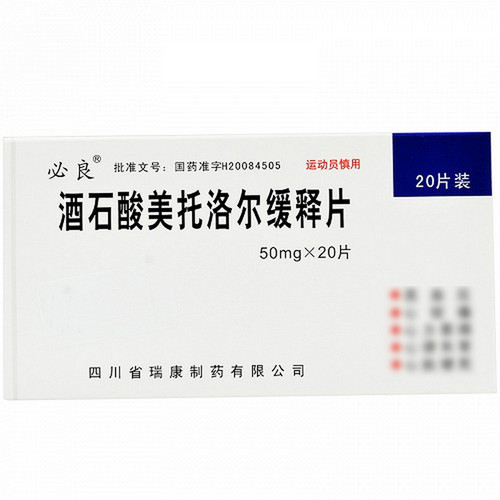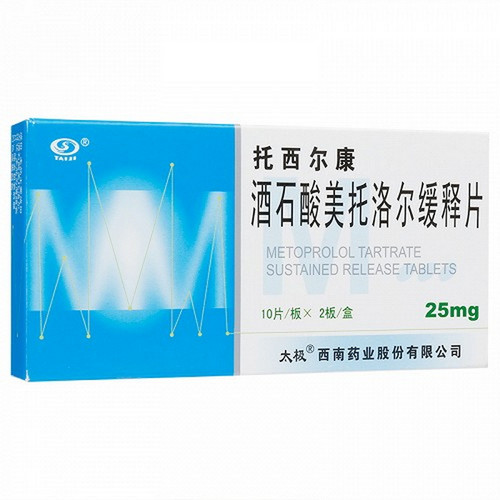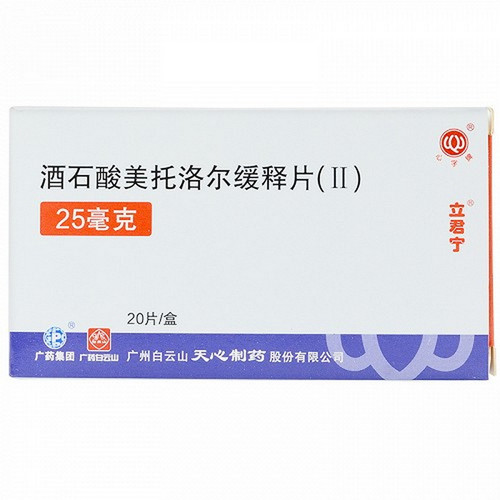Product Overview
[Drug Name]
Generic Name: Metoprolol Tartrate Sustained-Release Tablets
Trade Name: Le Rui Metoprolol Tartrate Sustained-Release Tablets 50mg*18 Tablets
Pinyin Full Code: LeZuoJjiuShiSuanMeiTuoLuoErHuanShiPian 50mg*18 Tablets
[Main Ingredient]
Metoprolol Tartrate.
[Properties]
This product is a film-coated tablet. When the film coating is removed, it appears white or off-white.
[Indications/Main Functions]
It is used to treat hypertension, angina pectoris, myocardial infarction, hypertrophic cardiomyopathy, aortic dissection, arrhythmias, hyperthyroidism, and cardiac neurosis. In recent years, it has also been used to treat heart failure. In this case, it should be used under the guidance of an experienced physician.
[Specifications]
50mg*18 tablets
[Dosage and Administration]
For the treatment of hypertension: 0.1-0.2g daily, taken in the morning or as directed by a physician. For the treatment of angina pectoris: 0.1-0.2g daily, taken in the morning or evening, or as directed by a physician.
[Adverse Reactions]
A small number of patients may experience fatigue, gastrointestinal disturbances, and drowsiness initially after taking this medication, which resolve spontaneously with continued use. Nonspecific skin reactions and chills may occur occasionally.
[Contraindications]
Significant bradycardia (heart rate <45/minute), cardiogenic shock, severe or acute heart failure, poor peripheral perfusion, second- or third-degree atrioventricular block, sick sinus syndrome, and severe peripheral vascular disease.
[Drug Interactions]
Combination with cimetidine or pre-administration of quinidine may increase metoprolol blood concentrations.
[Precautions]
1. Like other antidepressants, metoprolol tartrate extended-release tablets should generally be gradually withdrawn over 7-10 days. 2. For patients undergoing general anesthesia, discontinue metoprolol at least 48 hours before anesthesia. 3. Patients with insulin-dependent diabetes should use this medication under the guidance of a physician. 4. Use with caution in pregnant and postpartum women.
[Use in Children]
Unclear.
[Use in Elderly Patients]
Unclear.
[Overdose]
Overdose can cause significant hypotension and bradycardia. In this case, 1-2 mg of atropine can be administered intravenously, followed by administration of metaraminol or norepinephrine. If intravenous beta-blocker administration causes severe side effects such as atrioventricular block, severe bradycardia, or hypotension, rapid correction can be achieved with an infusion of the beta-agonist isoproterenol at a rate of 1-5 μg/minute. In another case of acute poisoning, after taking 200 50 mg tablets at once, the patient developed weak heart sounds and unmeasurable blood pressure. Treatment with metaraminol and other medications was successful.
[Pharmacology and Toxicology]
This drug is a Class 2A beta-blocker (cardioselective beta-blocker) with no partial agonist activity. It selectively blocks β-receptors, lacks PAA (partial agonist activity), and has no membrane-stabilizing effects. Its β-receptor blocking effect is approximately equivalent to that of propranolol (PP), but its selectivity for β-receptors is slightly lower than that of atenolol. Metoprolol's cardiac effects, such as slowing heart rate, inhibiting cardiac contractility, reducing automaticity, and delaying atrioventricular conduction time, are similar to those of propranolol and atenolol (AT). Its effect on reducing elevated blood pressure and heart rate during exercise testing is also similar to that of PP and AT. Its contractile effect on vascular and bronchial smooth muscle is weaker than that of PP, resulting in less impact on the respiratory tract, but still more potent than that of AT. Metoprolol also reduces plasma renin activity. Toxicology: This product is non-mutagenic and has no effects on the fetus. No benign or malignant neoplasms were observed in rats given 800 mg/day of this product for two years.








